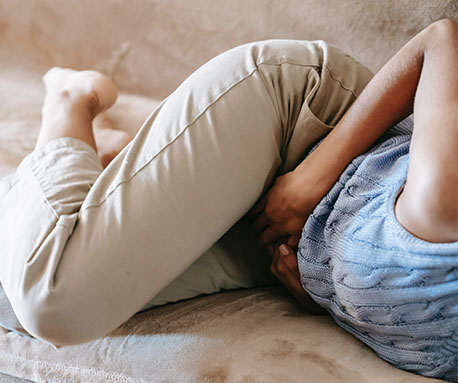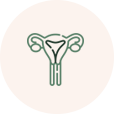"We know it’s real, and we know it’s hard to live with and can impact your day-to-day living. Our promise is to thoroughly investigate your pelvic pain"
Many different conditions can result in pelvic pain, affecting 1 in 5 women, and causes pain or tenderness in the area below your belly button and between your hips. Because there is no single test for it, getting to a diagnosis is often slow and frustrating. As a result, many women are left to put up with pelvic pain, often for many years.

As a dedicated women’s health practice, the Full Circle team takes a special interest in pelvic pain. We know it’s real, and we know it’s hard to live with and can impact your day-to-day living. Our promise is to thoroughly investigate your pelvic pain, accurately diagnose it and recommend evidence-based treatments to help you move past it.
Full Circle has invested in a specialised Gynaecology examination chair, making examination easier and more comfortable for the patient.
Dr Ganu is a skilled laparoscopic surgeon experienced in treating all aspects of pelvic pain to create a better future for women. Laparoscopic surgery is a keyhole surgery that offers a quicker recovery with minimal scarring. Laparoscopic surgery can be used to perform hysterectomies, treat endometriosis or pelvic pain, remove ovarian cysts or treat other causes of abnormal bleeding. We would always explore this option first before considering open abdominal or transvaginal surgery.
Pelvic pain may be a symptom of another condition such as:

where tissue like that which lines your uterus grows outside it, around your pelvic organs. This extra tissue thickens each month with your menstrual cycle, just as it does inside your womb before flowing out in your period. However, the extra tissue is in the wrong place and cannot leave your body.

disease when a long-lasting infection, often contracted during sex, scars your pelvic organs.

these benign growths in your womb, can cause a sense of pressure or heaviness in your lower tummy.

the associated bloating, constipation or diarrhoea, can cause pressure in your pelvis.

conditions that affect your bones, joints and connective tissue can lead to pelvic pain. That includes conditions like fibromyalgia, pelvic floor muscle spasm, or pubic joint inflammation.

can worsen the experience of pelvic pain, though pelvic pain can also cause emotional distress, leading to a vicious cycle.
If pelvic pain is impacting your life – reducing your enjoyment of life, preventing you from doing activities you usually enjoy, disrupting your work or education – then get help.
Your GP is often a good place to start since they know you and can refer you to a specialist like Dr Ganu.
Look for a place like Full Circle where the healthcare professionals:
At home, you can try over-the-counter painkillers, stretches, exercise, or a hot pack to stimulate blood flow or relaxation exercises to help reduce stress as you live with pain.
Really, though, pelvic pain is relieved by seeing an expert like Dr Ganu to obtain an accurate diagnosis and evidence-based treatment.
It can be difficult to get the information you need about pelvic pain. We encourage you to check out the Pelvic Pain Foundation of Australia to learn more about this condition.
